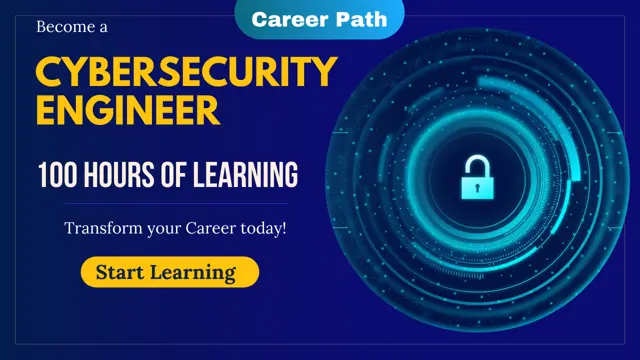
Cybersecurity Engineer Career Path
Self-paced videos, Lifetime access, Study material, Certification prep, Technical support, Course Completion Certificate
Uplatz
Summary
- Uplatz Certificate of Completion - Free
Add to basket or enquire
Overview
Uplatz offers this comprehensive Career Path program on IT Security / Cybersecurity Engineer. It is a self-paced program consisting of video courses with recorded lectures. You will be awarded Course Completion Certificate at the end of the course.
In today's world of fast-growing threats and sophisticated cyber warfare, enterprises need to be cautious in repelling attackers and safeguarding information assets. IT security professionals employ an in-depth grasp of cyber security risks, technologies and responses to maintain safe computer systems. This frequently involves duties like installing and configuring security software to avoid attacks, training personnel on data security, monitoring and defending against network breaches, and reacting to cyber-attacks with the proper remedies.
Specific ramifications from security breaches might differ depending on the sort of job a business undertakes. Generally, cyberattacks may result in the loss of customer trust, sensitive information breaches, network outages, halted production, and compliance violations, providing security professionals a critical role in their company’s overall health. Security analysts spend their days analyzing the devices in use, examining network topology, and testing security measures like firewalls and software permissions. They seek for weak places and attempt to build up defenses. They also report periodically to senior administration and may have to submit findings and suggestions to management. Security analysts may collaborate with other departments to ensure their colleagues understand the organization’s best practices for information security.
Learn the essential ideas required to defend your organization's network as an IT security professional. In this IT Security Specialist career path program, we'll cover all the fundamentals of IT security: from practical skills for safeguarding hardware and network data to the principles of cryptography and cybercrime investigation and response. Employers frequently demand security specialist applicants to have past employment experience, either via entry-level roles with information security teams or internships undertaken as part of college studies. Workforce need for computer security professionals is significant in all sectors, including enterprises, schools, medical practices, and government organizations. According to the U.S. Bureau of Labor Statistics, the IT security expert job market will rise by 33 percent from 2020 to 2030, far higher than the 8 percent average for all professions, making it among the nation's fastest rising career choices.
An IT security specialist is a subject matter expert employed by an organization to protect their data. They do this through a variety of techniques, such as probing for weaknesses, monitoring systems and networks for attempted breaches and then dealing with any that are found. This includes repairing and then strengthening the areas where an attack may have occurred.
IT security analysts are the front-line defense of networks, looking for and analyzing potential security risks. They put firewalls and encryption in place to protect against breaches, and constantly monitor and audit systems for any abnormal activities. They detail their findings in technical reports. They work with law enforcement agencies in both public and private sector organizations and are asked to undertake a wide variety of tasks, including:
- Recovering deleted files
- Interpreting data linked to crime
- Analyzing mobile phone records
- Pursuing data trails
Certificates
Uplatz Certificate of Completion
Digital certificate - Included
Course Completion Certificate by Uplatz
Course media
Description
Course Objectives
- Develop strategies to secure computer data against unauthorized change, destruction or disclosure.
- Choose, deploy, monitor and update computer anti-virus and malware security programs.
- Encrypt data communications and create firewalls to disguise secret information during send.
- Implement password authentication to prohibit unauthorized people from accessing sensitive data files.
- Modify security files to include new software, repair problems, and modify user access status.
- Perform risk evaluations and testing on operating data processing operations and security measures.
- Educate personnel about computer security and increase security awareness and security standards.
Who is this course for?
The target audience for a Cybersecurity Specialist career path programme is typically individuals who are interested in pursuing a career in cybersecurity, information security, or IT security. This may include recent graduates or professionals who are looking to gain specialized knowledge and skills in cybersecurity, and are interested in pursuing a career as a Cybersecurity Specialist.
In addition, the programme may be suitable for individuals who are currently working in the IT or cybersecurity field, but are looking to specialize in a particular area of cybersecurity or take on more senior roles in their organizations. The programme may also be relevant for individuals who are interested in starting their own cybersecurity consulting business, as it provides a strong foundation in cybersecurity concepts, tools, and best practices.
The Cybersecurity Specialist career path programme is designed to provide a comprehensive education in cybersecurity, including risk assessment, network security, vulnerability management, and incident response, and is suitable for individuals who are interested in pursuing a career in cybersecurity or related fields. The programme may require some prior knowledge of IT or cybersecurity concepts, but may also include introductory courses for individuals who are new to the field.
Requirements
Passion & determination to learn and succeed!
Career path
- IT Security Specialist
- Cybersecurity Engineer
- Cybersecurity Specialist
- IT Security Engineer
- Cloud Security Engineer
- Cyber Expert
- Cloud Platform Security Engineer
- Cybersecurity Advisor
- Chief Information Officer
- Chief Security Officer
- Chief Data Officer
- Database Administrator
- System Administrator
- Cybersecurity Analyst / Engineer
Questions and answers
Currently there are no Q&As for this course. Be the first to ask a question.
Reviews
Currently there are no reviews for this course. Be the first to leave a review.
Legal information
This course is advertised on reed.co.uk by the Course Provider, whose terms and conditions apply. Purchases are made directly from the Course Provider, and as such, content and materials are supplied by the Course Provider directly. Reed is acting as agent and not reseller in relation to this course. Reed's only responsibility is to facilitate your payment for the course. It is your responsibility to review and agree to the Course Provider's terms and conditions and satisfy yourself as to the suitability of the course you intend to purchase. Reed will not have any responsibility for the content of the course and/or associated materials.



